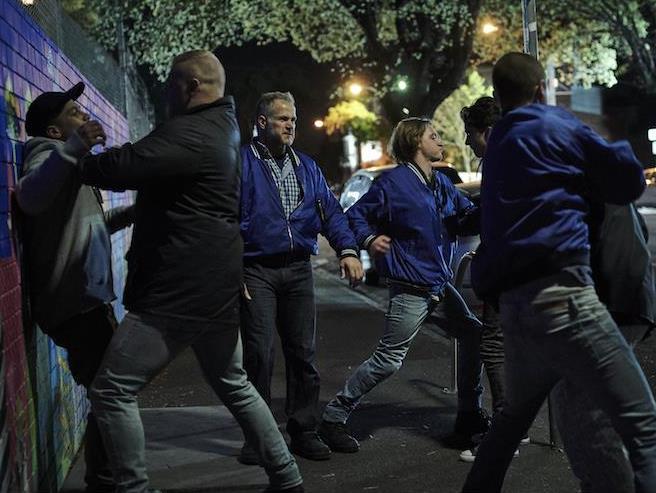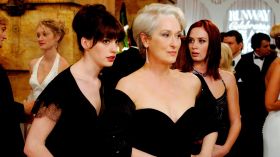Who does the future belong to?
We are certainly in the middle of a moral blizzard at the moment. Harvey Weinstein and his domineering ilk are being criminalised while many others are becoming unpersons for their sexual behaviour. This has universal public backing. But there is another moral current at work which is deeper and more sinister – we sense the evil smell of racism in our public life, we see it reappearing and we are terrified of its power to smash societies.
Do artists have an untrammelled right to cover any topic, and empathise with any world view? Should some topics be chained in the basement? Or is the beast managed by dragging it into the light? Romper Stomper, quietly sleeping for 25 years, is back in more savage times.
The film was made by Geoffrey Wright, one of our truly distinctive film directors, who went on to make Metal Skin and Macbeth. He is now a key figure behind the television series which returns to Romper Stomper 25 years later.
I asked him about the most basic unifying factor in his films.
‘Obviously several things at once’, he said. ‘I think it just comes down to a character wanting something desperately and taking action.’
Romper Stomper is the film which provoked David Stratton to abandon his intellectual distaste for censorship for a visceral loathing of the violence. ‘In these volatile times, with racism on the march again all over the world, this is a dangerous film,’ he said. He refused to review it and has always defended that position, even though he seems quaint and silly in some eyes.
Variety’s 1994 review of Wright’s next film, Metal Skin, was brutal. ‘Goosed up with car-smashing violence, Satanism and plenty of fancy editing tricks, Geoffrey Wright’s follow-up to his controversial 1992 “Romper Stomper” sports the sort of fashionably nihilistic gear to put it over with a certain segment of hip young moviegoers, but its lack of appeal on virtually all aesthetic levels will mostly limit its commercial prospects to a hard-core heavy-metal and leather set.’
But Wright has always had a passion for action and emotional extremity. His idea of the perfect action film is Scorsese’s Taxi Driver, which he says ‘constantly expresses itself through fluidity and motion.
‘Stanley Kubrick said the truth of a thing is in the feel of a thing and not the think of it. I think Kubrick is right. Good films strip away our preconceptions and cultural baggage and put you in a situation where you are open to the tingle of your senses and your instincts. I think profound experiences in the arts are always to do with feelings. The feelings come first and then comes the thought to encapsulate and record.
‘But the modern work keeps telling you your instincts are wrong, to create order, and that process can go too far.’
He went to the US to build his career, where he was pigeonholed as a man with a passion for action films. ‘The problem with Hollywood is that it wants to take that impulse and put it to a banal use. After Metal Skin they threw me onto Speed Racer and there’s a certain logic in that, but Speed Racer is fairly mindless and I could never get any traction on it.
‘I need psychology and movement simultaneously. If there is really no psychology I can’t get my teeth into it. I’ve never been prepared to earn my stripes by doing a programmatic type action film because I could never get involved.’
Speed Racer was a monster, chewing up ideas and hopes. Based on a Japanese manga, it was in development from 1992 until around 2006 when it was made by the Wachowski brothers and bombed at the box office.
Wright made Cherry Falls with a lot of knives, virgins and dead teenagers in the late nineties, as the company changed owners and direction in mid-production. It went straight to cable.
In the mid-2000’s, Wright came back to Australia to make a modern day gangland version of Macbeth with Mushroom Pictures. After all, Baz Luhrmann was spectacularly successful ten years earlier with Romeo + Juliet, which was a doomed romance, and incredibly mannered, feeding only on cinematic inspiration.
Wright and cowriter Victoria Hill wanted something much grittier, as if Scotland was replaced by St Kilda’s Gatwick Hotel.
The gangland transposition has been tried several times, and the only successful version seems to have been Vishal Bhardwaj’s Bollywood Maqbool in 2003. The Wright Macbeth was written off as a box office flop.
While Wright continued to write, taught at Deakin University and made films to train lawyers, the cancer of racism metastised around the world. We began to see that the violence in Romper Stomper was almost innocent, but the fear of the racism it allegedly fed was prophetic. Since then cultures have been put to the sword and entire countries have been smashed, until we have some 65 million people on the run around the world, posing enormous moral dilemmas and visceral terrors of invasion.
Geoffrey Wright has stuck to his original vision of himself and his work. ‘I’ve always been committed to the externalisation of emotion. Powerful emotions that can be expressed through what can be photographed. Because cinema is only movement and light and a sound track – it is not more, not in a material sense, that’s for sure.’
Meanwhile, said Wright, the industry was decaying. ‘The films that are most significant in terms of making a cultural impact are few these days because the industry has become very homogenous and weeds out idiosyncracy and a personal point of view, except in films made for TV or talking heads cinema. We don’t get The French Connections any more and everything is more bland.
‘The critical vocabulary has been dumbed down. A small bag of terms is used to speak to society in general.
‘The West has become a little timid in storytelling. One explanation is political correctness but there’s other reasons. It is presently in decline, that much is very clear. Something is winding down about the courage – there is a loss of confidence, no longer pushing but taking steps backwards and it’s not as arresting.’
Roadshow Rough Diamond, through John and Dan Edwards, wanted to make a six part version of Romper Stomper set 25 years after the original. How would the DNA of the film be recoded into the new Golden Age of Television?
Geoffrey Wright came back on as setup director of the first two eps, followed by Daina Reid and James Napier Robertson. The writers were Wright, Robertson, Omar Musa and Malcolm Knox.
‘It is not like a movie where one clear person is at the helm,’ he said. ‘I am part of the team. I have a lot of responsibility over block one and overall because I supplied the story for that. I hope we are as brave as we can be.
‘Our directing styles are quite distinct. But simple signs can go a long way. Every shot is handheld or with a shotbag and it reverberates through the whole show. I have a style which is certainly identified with it immediately.’
‘I don’t question morality. I am just happy to go in there and create the beachhead and just usher the other two through. I don’t have any qualms.’
He claimed that the DNA of the original movie is critical, and that extends to involving members of the old crew as well, while some elements of the style underpinned the later decisions. ‘Cinematographer Bonnie Elliott was riffing on the music, and the art of the camera that Ron Hagen developed with the old sprocketless Super 16 scanner from the movie. She’s got several digital cameras but she does her own thing to recognise Ron Hagen’s approach.’
Some of the timidity he sees in film also permeates television. ‘There is a knee jerk reaction to play the character out in a language which is very quickly understood. This person is good, this person is bad. Internal contradictions in characters have been lost a little bit in the current era. The ABC and SBS tend to over-editorialise on the moral position of their stories. Theres’ a lot of telling people how they should feel and think and I have a gut reaction against all that stuff.’
At the same time, the six hours of television creates a much larger canvas. The raw intensity of a 112 minute roller-coaster into skinhead violence is replaced by multiple points of view from all the opposing sides. And that brings its own ‘moral physics’ in his phrase.
This is a big topic, and the discussion will evolve after Stan broadcasts it from the first of January. Perhaps we simply don’t want to have anything to do with certain stories and emotions, and create censorship by collective distaste. We could fall for the old Puritan trick of burning the image because we can’t hurt the thing.
Whatever happens, we need to build storyworlds in which we can shape a catharsis which restores order and heals the moral universe. We are living in ugly, shivery times where our idea of a civilised, progressive society is being profoundly challenged.
One fact that the history of urban society teaches us: fighting in the streets is fun. Don’t deny it.
——
Karl Quinn has an excellent article about the production.





